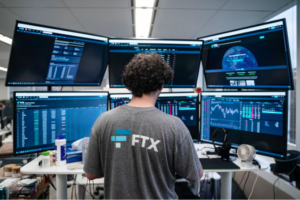As the popularity of cryptocurrencies continues to soar, so too does the importance of understanding the legal and regulatory framework surrounding crypto investments. In this blog post, we’ll explore the evolving legal landscape of crypto investments across different jurisdictions, shed light on how platforms like eToro.com prioritize legal and regulatory compliance, and discuss the measures taken to ensure investor protection in the crypto market.
Understanding the Legal Landscape:
The legal and regulatory environment for cryptocurrencies varies significantly from one jurisdiction to another. While some countries have embraced cryptocurrencies and enacted favorable regulations, others have taken a more cautious or restrictive approach. Here’s a brief overview of the legal landscape in different regions:
- United States: In the United States, cryptocurrencies are subject to a complex regulatory framework involving multiple federal and state agencies. The Securities and Exchange Commission (SEC) regulates securities offerings and exchanges, while the Commodity Futures Trading Commission (CFTC) oversees derivatives trading. Additionally, individual states may have their own licensing requirements for crypto businesses.
- European Union: The European Union (EU) has adopted a harmonized approach to cryptocurrency regulation, with the Fifth Anti-Money Laundering Directive (5AMLD) imposing strict KYC (Know Your Customer) and AML (Anti-Money Laundering) requirements on crypto businesses. The EU is also exploring the regulation of crypto assets through the Markets in Crypto-Assets (MiCA) proposal.
- Asia-Pacific: Countries in the Asia-Pacific region have implemented a wide range of regulatory approaches to cryptocurrencies. While some, like Japan and South Korea, have established licensing regimes for crypto exchanges, others, like China, have imposed outright bans on crypto trading and ICOs (Initial Coin Offerings).
Compliance and Investor Protection Measures:
In the dynamic and rapidly evolving crypto market, platforms like eToro.com are committed to upholding legal and regulatory compliance to safeguard investor interests. Here’s how eToro.com ensures compliance and investor protection:
- Regulatory Licensing: eToro.com operates under the supervision of regulatory authorities in various jurisdictions, holding licenses from reputable regulatory bodies such as the Financial Conduct Authority (FCA) in the UK, the Cyprus Securities and Exchange Commission (CySEC), and the Australian Securities and Investments Commission (ASIC).
- KYC and AML Procedures: eToro.com adheres to robust KYC and AML procedures to verify the identity of its users and prevent financial crime. By requiring users to undergo identity verification and compliance checks, eToro.com ensures a secure and compliant trading environment.
- Investor Education: eToro.com prioritizes investor education and awareness by providing comprehensive educational resources, including articles, videos, tutorials, and webinars on topics such as risk management, regulatory compliance, and investor protection.
- Transparency and Disclosure: eToro.com maintains transparency and disclosure standards by providing clear and accessible information about its operations, regulatory status, fees, and terms of service. By fostering transparency, eToro.com builds trust and confidence among its users.
Conclusion:
In conclusion, navigating the legal and regulatory landscape of crypto investments requires a nuanced understanding of the laws and regulations applicable in different jurisdictions. Platforms like eToro.com play a pivotal role in ensuring compliance and investor protection by adhering to regulatory requirements, implementing robust compliance measures, and prioritizing investor education and transparency. As the crypto market continues to evolve, it’s essential for investors to partner with reputable platforms that prioritize legal and regulatory compliance to safeguard their interests and promote a trustworthy and secure trading environment.


